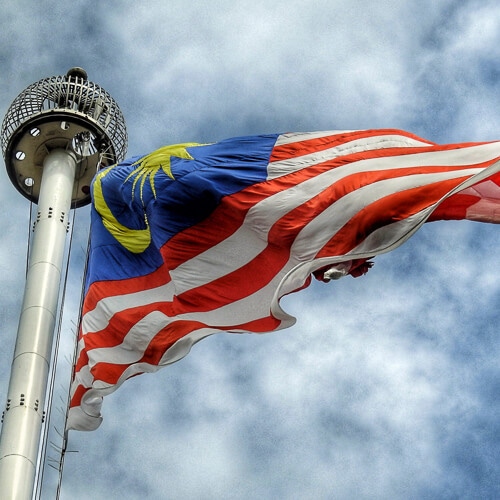
Malaysia's unusual path to 5G has taken another twist, with Ericsson unexpectedly winning the contract to build the national wholesale network.
Digital Nasional Berhad (DNB), the state-owned special purpose vehicle that will own and operate the network, has announced Ericsson will design and build it at a cost of 11 billion ringgit ($2.64 billion). The choice of Ericsson in a market that remains friendly to China and Huawei is certainly a surprise.
Figure 1:  Raise the flag: Malaysia's idea of building a single 5G network and leasing capacity to incumbent MNOs is an industry first.
Raise the flag: Malaysia's idea of building a single 5G network and leasing capacity to incumbent MNOs is an industry first.
(Source: mkjr_ on Unsplash)
DNB had sought bids from eight vendors: Cisco, Ericsson, Fiberhome, Huawei, NEC, Nokia, Samsung and ZTE. But Huawei was regarded as the favorite from the outset, with the government publicly rejecting US claims that the Chinese vendor was a security threat.
In February, Communications Minister Saifuddin Abdulla publicly name-checked Huawei at a meeting, declaring the Chinese firm would play a "very, very significant role."
Mixed messages
It is not clear if the decision was driven by economic considerations or if it was political, aimed at balancing western and Chinese interests. If purely economic, then one of the chief factors must be the financial terms. According to a DNB statement, Ericsson says it will "arrange financing for the supply, delivery, and management of the entire 5G network."
That's handy for the DNB, because it had been unable to explain whether the project would be financed publicly or privately. Even better, Ericsson has committed to shaving a quarter off the DNB's budgeted cost of 15 billion ringgit. Ericsson hasn't disclosed how the ten-year project is being financed. A spokesperson said the arrangements were still being finalized.
It is unusual for western vendors to bring financing to their deals – that's been the Chinese playbook for the past dozen years.
In that respect this project has echoes of the Ethiopian 5G deal six weeks ago, where the Beijing-friendly government awarded a licence to a consortium financed by US and UK aid agencies. Whatever the reasons, it is another win for the US in its global effort to oust Huawei from the 5G business.
DNB says the first services will start by year-end in Kuala Lumpur, Putrajaya and the Cyberjaya hi-tech zone. Further services will launch in five major cities and districts in 2022 and will serve 80% of the population by 2024.
First try
Malaysia's idea of building a single 5G network and leasing capacity to incumbent MNOs is an industry first. It has obvious cost advantages for a developing economy but also limits operators' ability to differentiate. Its progress will be watched keenly by the rest of the industry.
The wholesale network plan was developed by the regulator, the Malaysian Communications and Multimedia Commission, after industry consultations early last year.
Want to know more about the core? Check out our dedicated core channel here on
Light Reading.
But the process was almost derailed last June when the minister unexpectedly issued 700 MHz spectrum to five operators – then walked back the decision within 24 hours.
Operators were also shaken by the awarding of (non-5G) spectrum to MVNO Altel last month. DNB, formed by the Ministry of Finance in March, will commercially manage the network and ensure equal access to service providers.
CEO Ralph Marshall said it would work with MNOs to identify key verticals and create 5G applications. It would also provide infrastructure and technology services to support business and government capabilities.
Related posts:
— Robert Clark, contributing editor, special to Light Reading
Read more about:
AsiaAbout the Author(s)
You May Also Like











